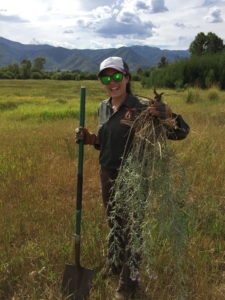 By Sydni Dobson
By Sydni Dobson
Meet Hannah Rettig, Recreation and Partnerships Resource Assistant who joined the Resource Assistants Program (RAP) in September 2019. RAP is a USDA Forest Service program to provide a rigorous and immersive internship experience for those interested in career opportunities with land management agencies. Resource Assistants (RAs) are recruited by partner organizations – such as The Corps Network and our member Corps – and work under the supervision of Forest Service staff to accomplish mission-critical work. Hannah Rettig was recruited through Utah Conservation Corps (UCC).
Prior to joining RAP, Hannah worked as a Crew Leader for UCC doing urban conservation work. After serving three months as a UCC Crew Leader, Hannah’s Program Director mentioned the opportunity to join RAP. Hannah’s knowledge of the Forest Service was limited to previous trail work, so she was hesitant to dive into a new industry, but she ultimately took the plunge and joined. Thus far, the Resource Assistant experience has shifted Hannah’s focus to outdoor software development. Learn more about Hannah’s story from her conversation with The Corps Network, where we discussed her time in RAP and her new outlook on contributing to the future of conservation.
Q: How has this experience with RAP compared to your previous work or internship experiences?
A: The RAP Partnership position was very different, but very good as well. The position in UCC was more as a leader. But the RAP program was role reversal – it really did the opposite of what I had been doing in the field. I was gaining experience by working in the office for the region and learning from the experienced people around me.
Q: How has your experience been in RAP?
A: I definitely increased my patience – but also learned from the very experienced people in the office, as most of the people who worked there were towards the end of their careers.
Q: What was one of your most impactful moments in RAP?
A: One important project was the Chief of Forestry’s Chief Review. The forestry service comes to the region to show the Washington Office [USDA Forest Service headquarters] what all has been going on in the region. I volunteered to help at the conferences and sat in the seminars and got to learn about the Intermountain Region and projects that the region had been doing over the past few years. It was kind of impressive to learn about everything that was going on because it was really only my third or fourth week.
Q: What has been your favorite project or learning experience in the program?
A: Working with the engineering department on trail bridges – the old program was neglected and out of date. They asked whether I would want to check out the data on the database and see how accurate the data was. The database was full of trail bridges from the National Forest (NF) and they had not been adequately updated in a while. Bridges have to be safely inspected every five years, and some of that data was unavailable. So, we had to send people out, and I worked to make the data collection program specialized. I created a map of the park to verify the bridges within the park. I spent about six months on the project looking at the map and trying to find the specific coordinates for the bridges using GIS software, and specific points to find the location of the bridges from USDA’s photos and Google Earth. If we couldn’t find one using the software, then we would send people into the field to locate the bridges’ exact locations.
Q: What is the average week like in your RAP position?
A: Office based – I work at the regional branch, where many people are at the later stages of their career seeing the NF from the thousand-foot level. Working from home was a forced opportunity to adapt and learn how to telework. The whole staff has been learning how to use Teams and video calls, because that was never needed in their service before.
Q: How have you grown since joining RAP?
A: I’ve learned more patience and flexibility with the way my positions started. If I can say yes to things – I generally try to. I was open to whatever projects they wanted me to do, so I delved into it by taking any opportunities I can get. I saw the value in getting into projects hands-on.
Q: Have your career interests changed since joining RAP?
A: Yes, they have a little bit. I felt like I was going towards a more conservation-centered career. But, I’m excited to see if I can develop my skills with GIS and maybe get a position working with that software, because part of it is working with the outdoors and I have enjoyed it.
Q: What will you do after your internship ends?
A: When I heard about the Direct Hire Authority (awarded at the end of a successful internship), I was all about it; but now I am thinking about exploring the GIS stuff I’ve been working on. I am hoping to try and get my certificate, so maybe I can explore that route, but I will definitely be open to coming back and working at the Forest Service in the future.





































































